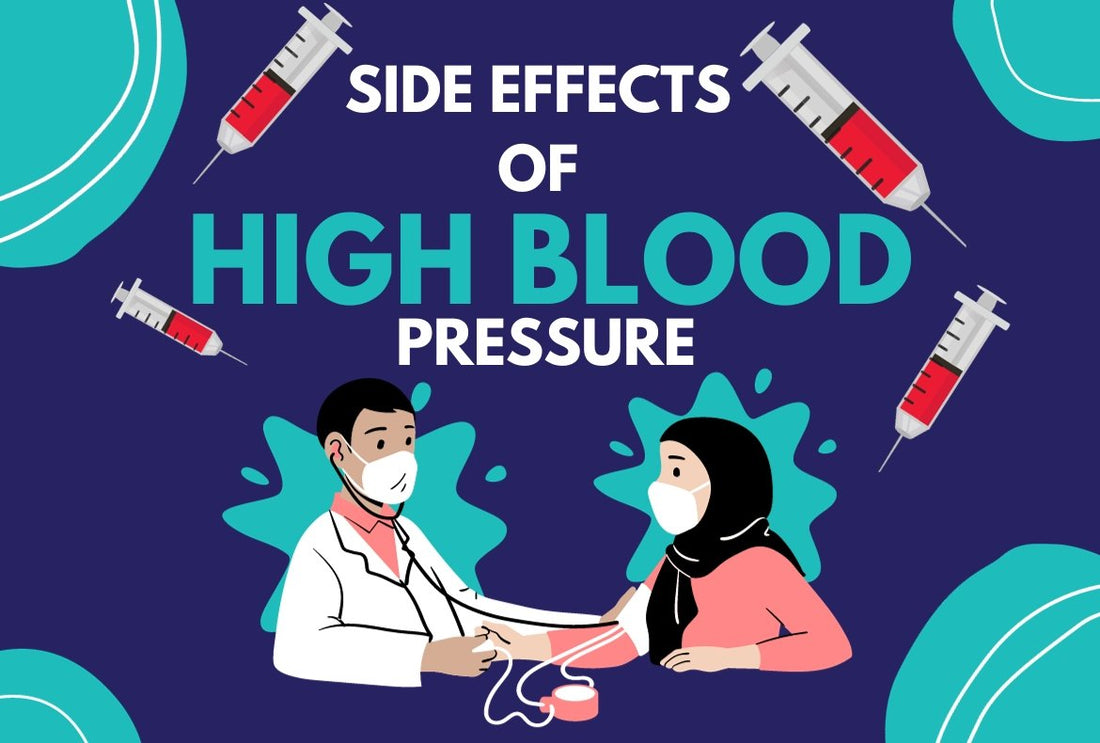Understanding High Blood Pressure
When the pressure exerted by your blood on the walls of your arteries is abnormally high, high blood pressure results. Serious health complications like heart disease, stroke, and kidney problems can result from this condition. Lifestyle factors such as exercise, diet, and stress management are significantly influenced in managing blood pressure, but for many individuals, medications are also required to achieve and maintain healthy levels.
Common Medication Side Effects
Although medication for hypertension can be quite successful, they frequently have side effects that can lower your quality of life. It's significant to note that not everyone will encounter these side effects of high blood pressure, and their severity can vary. Here are a few typical negative effects when taking medications for high blood pressure:
- Fatigue and Dizziness: Some blood pressure medications can make you feel drained and lightheaded, especially when you stand up fast. This can increase the chance of slips and accidents.
- Headaches: Blood pressure medication frequently cause headaches as a side effect. Depending on the person and the particular medication, these headaches could be minor or severe.
- Nausea and Upset Stomach: Certain blood pressure medications can cause stomach pain, nausea, and other digestive issues.
- Cough: Some blood pressure medication are known to cause a chronic dry cough, which can be annoying and may call for a change in treatment.
- Leg Swelling: Swelling of the feet, ankles, or legs, known as peripheral edema, can occur.
- Increased Urination: Some medications may show an increased urination, which can be inconvenient, especially during night times.
- Rash and Skin Reactions: Skin rashes or other skin reactions are potential side effects of blood pressure medications.
Lifestyle Modifications to Minimize Side Effects
Fortunately, there are many lifestyle modifications you can adopt to minimize the side effects of high blood pressure medications and enhance your well-being:
- Stay Hydrated: Proper hydration can help decrease the risk of side effects like fatigue and headaches. Drinking enough water is very important if your medication induces increased urination.
- Monitor Your Blood Pressure: Utilize a home blood pressure monitor to check your blood pressure frequently. This might assist you and your doctor in evaluating the effectiveness of your medicine and making the necessary adjustments.
- Take Medications as Prescribed: Obey your doctor's instructions regarding medication dosage and timing. Skipping doses or taking more than prescribed can cause difficulties.
- Maintain a Healthy Diet: Incorporate a diet rich in vegetables, fruits, whole grains, and lean proteins. Reduce your sodium consumption because it can lead to high blood pressure. Some medications may require dietary restrictions, so consult with your dietitian.
- Exercise Regularly: Regular physical activity can reduce blood pressure and enhance cardiovascular health in general. Aim for 150 minutes or more per week of moderate-intensity exercise.
- Manage Stress: Long-term stress can increase blood pressure and make the negative effects of high blood pressure medication worse. Use stress-reduction methods like yoga, deep breathing exercises, or meditation.
- Limit Alcohol Consumption: Drinking too much alcohol can cause high blood pressure and may interfere with your medication. If you decide to consume alcohol, do so moderately.
- Quit Smoking: Smoking significantly raises your risk of heart disease and high blood pressure. Both your general health and the efficiency of your medicine can be improved by quitting smoking.
- Get Adequate Sleep: Prioritize sleep by aiming for 7-9 hours of quality sleep each night. Proper rest can help control stress and fatigue, which can be worsened by medication side effects.
Seeking Medical Help
It's crucial to know when to get medical help regarding medication side effects high blood pressure or difficulties related to high blood pressure:
- Severe Allergic Reactions: Seek emergency medical help if you have symptoms including breathing problems, face or throat swelling, a severe rash, or hives. These can indicate that the medication is causing a serious allergic reaction.
- Persistent or Worsening Symptoms: If your side effects don't improve or become worse over time, contact your doctor. They may require you to alter your medication or explore alternative treatment options.
- Unusual or Severe Mood Changes: If you see significant changes in your mood, behavior, or thoughts, especially if they involve thoughts of self-harm or suicide, seek help immediately.
- Significant Changes in Vital Signs: Contact your healthcare practitioner or seek emergency medical attention if you feel faint or your heart is beating quickly. These symptoms may suggest a requirement for medication adjustment.
Regular Monitoring for a Healthy Blood Pressure
Regular monitoring is important for managing high blood pressure effectively and ensuring your health and well-being:
- Follow-Up Appointments: Attend all scheduled follow-up meetings with your healthcare provider. These appointments allow your doctor to assess your progress, make necessary adjustments to your medication, and address any emerging side effects.
- Home Blood Pressure Monitoring: Monitoring your blood pressure at home can be valuable. Share your home blood pressure readings with your healthcare provider to track your progress between appointments.
- Lifestyle Adjustments: Continuously work on maintaining a healthy lifestyle, including diet, exercise, stress management, and avoiding tobacco and excessive alcohol.
- Know Your Numbers: Understand your target blood pressure range and work with your healthcare provider to achieve and maintain it. This may involve medication adjustments as needed.
Controlling high blood pressure often involves a variety of lifestyle modifications and medication. While medication side effects can be a challenge, they should not stop you from keeping a healthy blood pressure. By adopting healthy habits, closely observing your blood pressure, and seeking medical help when necessary, you can navigate the world of hypertension medications with confidence.

